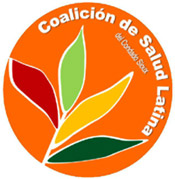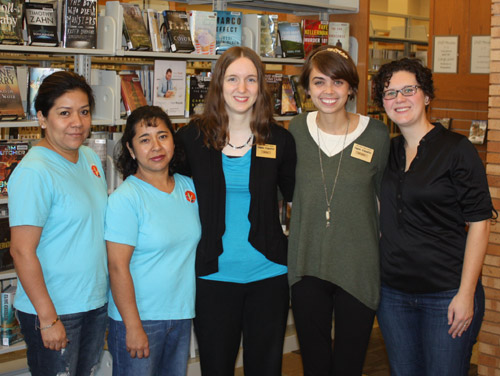Interview with the 2014 Mora Award Winner, Sioux Center Public Library
 For the fourth year, I’m honored to interview the winner of the Estela and Raúl Mora Award on my blog. Congratulations to the Día team who answered my questions.
For the fourth year, I’m honored to interview the winner of the Estela and Raúl Mora Award on my blog. Congratulations to the Día team who answered my questions.
From the Sioux Center Public Library:
Ruth Mahaffy, Bilingual Services Director/Outreach/Circulation
Melissa Hassman, Bilingual Services Assistant/Outreach/Circulation
From the Sioux County Latina Health Coalition
(Coalición de Salud Latina de Sioux County):
Sandra Rosales and Vianey Garcia
Briefly introduce yourselves and your program.
Ruth: I’m from Iowa and have been working at the Sioux Center Public Library since 2009. I’ve had the joy of starting our bilingual services to the growing immigrant population. According to the latest census data, 13% of Sioux Center’s population is Hispanic. Many of these are young families as reflected in the community school having a 35% Spanish-speaking population. I love working with these families and children and learning from them and their culture!
Melissa: I’m also from Iowa and joined the bilingual services department at the library in 2013. Even in my short time here, we’ve been able to expand our bilingual programing and seen so many Hispanic families take ownership in using our services and spreading the word about literacy—very exciting!
How did you first become interested in Día and how long ago was that?
Ruth: My first introduction to Día was when I was studying abroad in Costa Rica in 2012 and my “niece” and her family went to a Día de los niños celebration. Día fits so well with our library’s mission, so I thought it would be  nice to bring the Día celebration to Sioux Center. Some of the Latina ladies I knew in town were also planning to have a Día celebration through the Latina Health Coalition, and I invited them to partner with us and celebrate together!
nice to bring the Día celebration to Sioux Center. Some of the Latina ladies I knew in town were also planning to have a Día celebration through the Latina Health Coalition, and I invited them to partner with us and celebrate together!
Melissa: I grew up in Marshalltown, Iowa, which has a large Hispanic population and also have spent time in several Central American countries. Through Latino friends, I learned about Día as a cultural holiday, so I was excited when I had the opportunity to become involved in it through the library!
When did you begin to plan your 2014 celebration? Did you work with a team and, if so, who created the team? Was having a team helpful? Challenging?
Ruth: Working with the Latina Health Coalition was wonderful! It did make it harder to find times to meet and plan, but our library staff supported us and covered desk as needed to allow us to meet. These ladies had the experience and expertise and played an essential role in attracting the Latino crowd and welcoming them to the library.
Melissa: I agree that Latina Health Coalition was a perfect partnership for us and worth all the logistical challenges. We were able to provide our literacy resources and knowledge, and they provided the cultural expertise and the community rapport to draw in many new families to our celebration.
What do you think made your 2014 celebration special?
Ruth: Our 2014 celebration will always be a special one, since it was our very first one! It was great to see the community—both Latino and Anglo—come together around books, children, and culture!
Melissa: Iowa in April can tend to be cold and rainy. So many families expressed gratitude to have something so positive, educational, and inclusive to the entire community to break up a spring afternoon. It was great to see entire families connecting with each other and the community—even across language and cultural barriers.
Latina Health: Día is part of our culture, so we have known about it and celebrated it all our lives.
How do you and your program and your department feel about winning the Mora Award?
Ruth: Completely surprised! We were never expecting to win the award, especially with our limited (almost non-existent) Día budget and our lack of experience, but it was encouraging to see our creativity and passion being recognized.
Melissa: We are honored and encouraged to continue to celebrate our cultural diversity as we provide literacy services.
Latina Health: We are so happy to receive this important award and honored that a small rural community would receive this recognition.
What did you learn from your celebration this year?
Ruth: The beauty of bringing cultures together around both things we hold in common (our love of reading, our kids) and things that make us beautifully different (our languages, our cultures). It was exciting to see these families interacting with each other! We could not have done this nearly as successfully without learning the importance of partnering with and listening to the guidance of the Latina Health Coalition.
Melissa: I learned that people are extremely supportive of events which bring the community together. We were very pleasantly surprised at the large turnout and the diversity of people who attended our event and spoke very positively about the value of communities coming together.
Latina Health: Events like these are very important because they help us feel united as a community.
What three key pieces of advice would you give to those ready to plan their first Día celebration in spring 2015? Advice to those who have celebrated before?
Ruth: Be creative/flexible, build partnerships/relationships, and put your heart into it.
Melissa: 1) Small things go a long way. 2) Don’t be afraid to ask the community for support. 3) Relationships are more important than programs.
Why are Día and sharing bookjoy important to you?
Ruth: Dí is a celebration of what we are doing all year long—sharing the love of books, supporting literacy and families. It is a reflection of my passions and of the role the library can and should play in strengthening our communities.
Melissa: I love books and children! I’m also passionate about bridging connections between people and cultures. Día fits perfectly with all these passions.
Latina Health: Día de los niños is a tradition that we bring from our country. In Mexico (and other parts of Latin America), the schools put on festivals, sharing toys and treat bags to celebrate children. This is a special day that North Americans can enjoy as well. Día is important because it allows them to learn about our traditions and share in our culture. Día is also a good way for us as Latinas to bring other Latinos into the library and to spread awareness of the free services that North American libraries offer as well.

The Día team, from left to right: Sandra Rosales & Vianey Garcia, representing the Sioux County Latina Health Coalition; Ruth Mahaffy & Melissa Hassman, from the Sioux Center Public Library and Kir, from Sioux Center Arts.
Very proud of our niece, Ruth Mahaffy, and of the great work she is doing in Sioux Center’s increasingly multicultural community. It’s enriching for everyone, I’m sure. Congratulations on winning this award!
Pat, this wonderful interview speaks so eloquently to your vision and dedication. Congratulations to the Sioux County Latina Health Coalition, the Sioux Center Public Library, and Sioux Center Arts. I know you are proud of them. Kay and I send our love and congratulations to you.
Dan